
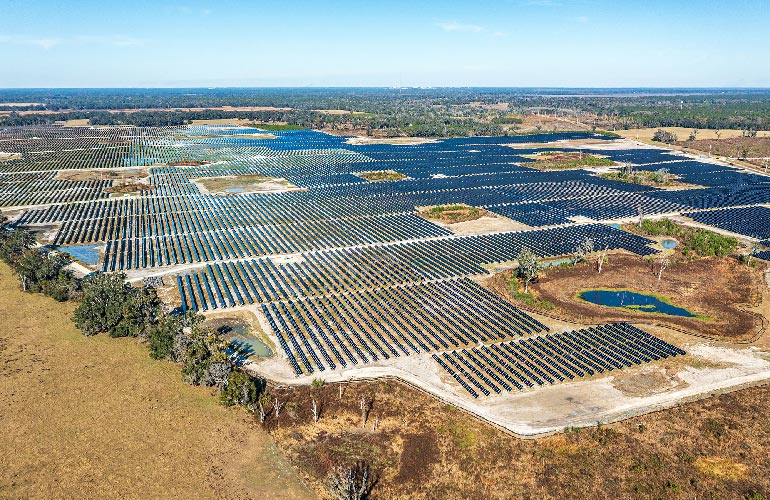
The 75-megawatt Whirlpool Duck Solar Energy Center has now been put into operation, providing solar power to four communities in Florida. Whistling Duck Solar is the fourth solar site in Florida Municipal Power Agency (FMPA)'s Florida Municipal Solar Energy Project, completing the second phase of the 300-megawatt project. Located in Lee County near Williston, Florida, the project was constructed by Origis Energy. Homestead, Key West, Fort Worth Beach, and Winter Park will each receive power from the Hooter Duck Solar Center. With the launch of the second phase of FMSP, Homestead, Fort Worth Beach, and Winter Park first received solar power from the Ridgecrest Solar Center in December last year. As the project coordinator, FMPA engages the municipal utility companies (member-owners of FMPA) to purchase electricity from the project. Origis Energy is the builder, owner, and operator of the facility. "We are proud to continue our collaboration with FMPA and its participating members. Windpipe Solar will directly contribute to FMPA's goal of providing efficient and stable solar power to the communities it serves," said Vikas Anand, CEO of Origis Energy. "We are excited about this project joining Florida's energy infrastructure." The Wheatstone Duck Solar Energy Project commenced commercial operations in December 2025, following the 75 MW AC Rice Creek Solar Energy Center, which was completed in December 2024.
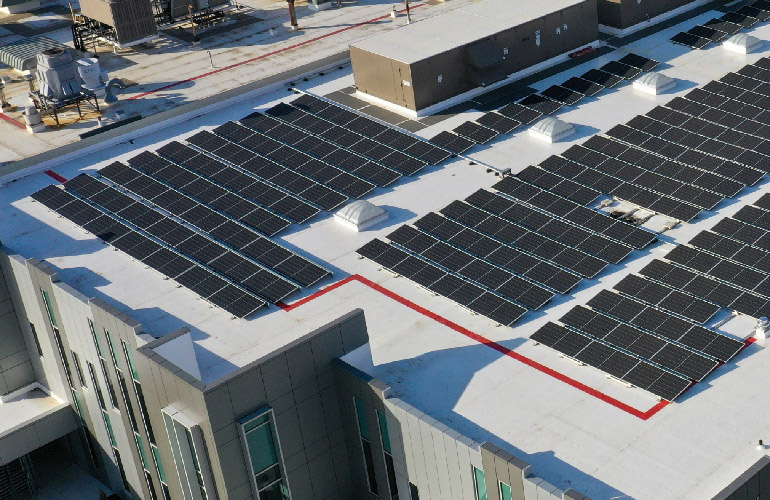
The expansion project of the Subaru manufacturing plant in Lafayette, Indiana, now features a 204-kilowatt solar system installed by Emergent Solar Energy. Subaru of Indiana Automotive (SIA) boasts an 820-acre campus with a monthly production capacity of 33,000 vehicles. Long recognized for its leadership in environmental practices, SIA is the first automotive assembly plant in the United States to achieve zero landfill status and has consistently invested in technologies that reduce waste, conserve natural resources, and lower greenhouse gas emissions. The new solar energy project continues this tradition, demonstrating how one of Indiana's largest manufacturers places renewable energy at the core of its cost control strategies and environmental aspirations. Scott Brand, President and Chief Operating Officer of Subaru of Indiana, stated, "The expanded rooftop project completed by Emergent Solar Energy further demonstrates our commitment to continuously reducing our environmental impact. By expanding the use of renewable energy at our facilities, we continue to adopt sustainable technologies to help offset our carbon footprint.". ” SIA has selected Emergent Solar Energy, headquartered in the Purdue Research Park in West Lafayette, as its partner for project design and construction. Emergent specializes in providing turnkey solar and energy storage solutions to large manufacturers and agricultural operations across the state. "Subaru of Indiana Automotive has set the standard for sustainable manufacturing in Indiana and the Midwest. We are honored to realize this vision through a solar energy project that will bring long-term energy savings, reduce emissions, and demonstrate how renewable energy can be seamlessly integrated with advanced manufacturing processes. This project reflects the possibility for industry leaders to take bold steps in addressing the future of carbon emissions," said Jeremy Lipinski, managing partner of Emergent Solar Energy. Adam Bolen, Project Manager of Emergent Solar Energy, stated, "Executing solar energy installation within a busy manufacturing campus requires rigorous safety deployment and precise coordination. We worked seamlessly with the SIA facilities team to ensure the safe and efficient installation of the array, without disrupting operations. We are very satisfied to see that the system is now providing clean energy to this impressive facility."

Plug-in solar energy, also known as balcony solar energy, is a popular choice in Europe and is now starting to be introduced in the United States. Last year, Utah introduced legislation, becoming the first state to allow the use of a 1.2 kW plug-in solar panel system without utility approval. Now, the largest solar energy state in the country has shown interest in plug-in solar energy. Earlier this week, Senate Bill 868, drafted by Democratic Senator Scott Wiener of San Francisco, was introduced to the California Senate. The Access the Sun Act would eliminate red tape and establish statewide safety standards for portable solar systems, which are commonly found on balconies throughout Europe. Reducing permitting and interconnection barriers would enable households to generate their own clean electricity and reduce electricity costs through plug-and-play solar technology. According to the Environmental Working Group, balcony solar systems can be installed on railings or tilted in the backyard, and plugged directly into a standard 120V outlet using an integrated micro-inverter. Some plug-in systems also include batteries. The solar systems are small, typically no more than 1.2 kW, and cost little more than $1,000. UL Solutions has noticed this and has launched a new testing program for plug-in solar systems. The program is based on the evaluation of UL 3700 (Outline Investigation for Interactive Plug-in Photovoltaic Devices). It defines the construction, performance, and labeling standards for plug-in solar systems, providing a reliable foundation for manufacturers to design products that consistently meet safety and performance requirements. Ken Boyce, Chief Engineering Vice President of UL Solutions' Industrial Testing, Inspection, and Certification Division, stated, "Our new certification program for plug-in solar systems provides clear information for manufacturers and consumers, allowing them to confidently adopt plug-in solar systems. "By defining how to construct these systems, evaluate safety, and ensure safe installation, UL 3700 helps reduce potential risks and opens the way for more people to access resilient solar energy. ” Solar energy systems connected to household circuits pose certain risks, such as system overload and the potential for electricity to flow back into the lines. In addition to defining safety standards for manufacturers, UL 3700 addresses these additional risks by requiring features that reduce the risk of accidental contact with hazardous electrical components, promote safe installation, prevent overload, and prevent current from flowing in the wrong direction. Plug-in solar energy systems certified by UL 3700 are suitable for tenants and homeowners who cannot install rooftop systems and can be used to provide backup power for critical equipment during power outages.
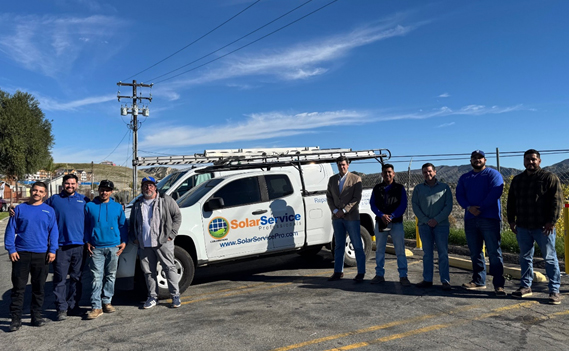
Residential solar operation and maintenance service provider Otovo has reached an agreement to acquire California-based solar service provider Solar Service Professionals (SSP). The acquisition of SSP is scheduled to be completed in early January, marking Otovo's entry into California, the largest residential solar + energy storage market in the United States. SSP, founded in 2017, has established a specialized solar energy service business with 38,000 installed customers. SSP will be integrated into Otovo's growing service business. Otovo will strive to convert SSP's existing California customer base to its subscription service, and this initiative is expected to increase net income by 2026. "This strategic acquisition marks a pivotal moment in Otovo's expansion into the United States, as we will launch innovative AI-based energy services in California, with the potential to expand to other markets subsequently, laying the foundation for significant growth in 2026," said William J. (John) Berger, CEO of Otovo. Otovo's integrated power partnership model combines retail electricity, energy services (operations and maintenance), and grid trading through a cloud-connected virtual power plant. Its AI-embedded Endurance platform can triage issues in real-time and arrange appropriate maintenance teams, connecting technicians, trucks, and installation equipment into a single response network. Real-time tracking functionality forms a closed loop with customers, while optimized routes improve first-time fix rates and reduce travel time.
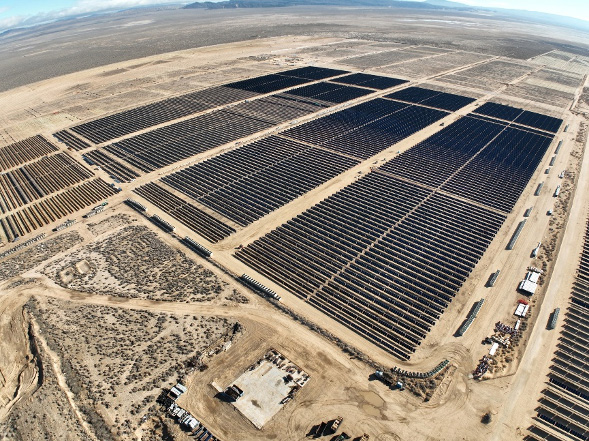
Terra-Gen, jointly owned by Masdar and Igneo Infrastructure Partners, has commenced commercial operations at the Lockhart CL I and II battery energy storage projects in San Bernardino County, California. The Lockhart CL I ESS project, built and located on the same site as the already operational Lockhart solar and battery resources, provides a capacity of 69 MW (276 MWh), while the Lockhart CL II ESS will add an additional 59.7 MW (238.8 MWh) of capacity. John O'Connor, CEO of Terra-Gen, stated, "California's clean energy goals are among the most ambitious in the country, and I am confident that our new Lockhart facility will positively impact the state's future through the provision of new, clean, and reliable energy sources." This 128.7 MW, four-hour lithium-ion battery energy storage system portfolio project comprises 164 battery enclosures and utilizes the existing generation tie-line connecting to the Edison Kramer Junction substation in Southern California. The utilization of resource adequacy capacity is fully contracted under two long-term resource adequacy agreements with Pacific Gas and Electric Company (PG&E). Gus Luna, Chief Development Officer of Terra-Gen, stated, "We designed this expansion to seamlessly integrate with our existing facilities and maximize the use of shared infrastructure. The Lockhart Complex demonstrates our team's ability to deliver comprehensive projects on time, on a large scale, and to the highest performance and safety standards." The construction of the new factory created over 115 jobs during its peak period, and workers completed a total of over 85,000 hours of work during the construction and operational transition period.
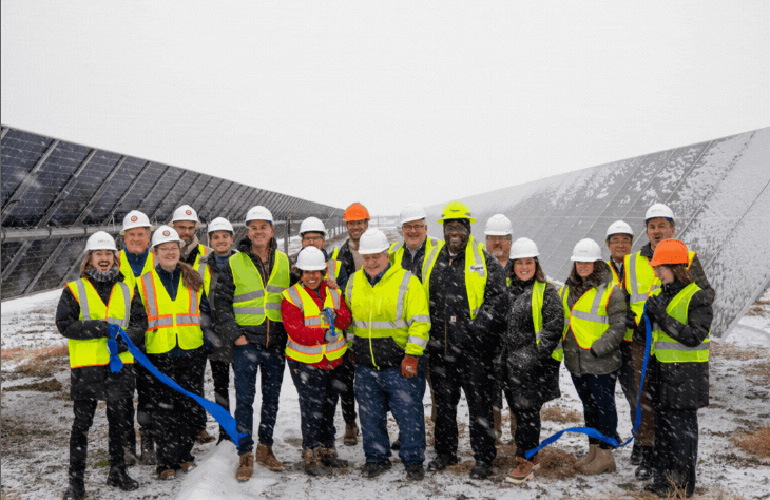
The first community solar project in Illinois, integrated with battery energy storage systems in the Ameren Illinois region, is now live. Similar projects have recently been launched in the ComEd region. The 6.9 MW Beardstown Solar Project, located in Beardstown, Illinois, is paired with an 11.9 MWh energy storage system owned by Equity Solar Illinois (ESI). The project was jointly developed and designed by project developer US Solar and battery integrator Eneon-ES. "Beard Solar underscores the importance of energy storage in modernizing our energy grid and expanding the benefits of clean energy," said Rena Henderson Mason, Director of ESI. "This project reflects ESI's commitment to combining clean energy development with community impact to build a grid that serves everyone.". ” Beard Solar will enable subscribers like local small businesses to reduce their energy costs and provide additional tax revenue to local taxing authorities. For example, the Beardstown Community Unit School District 15 will receive approximately $205,000 in tax revenue over the project's lifecycle (approximately 20 years). "We are proud to contribute to the first clean energy project in the Ameren Illinois region," said Huang Lu, Chief Technology Officer of Eneon. "By combining solar energy with energy storage, this project provides reliable and dispatchable power and enhances the grid resilience of the Illinois community."
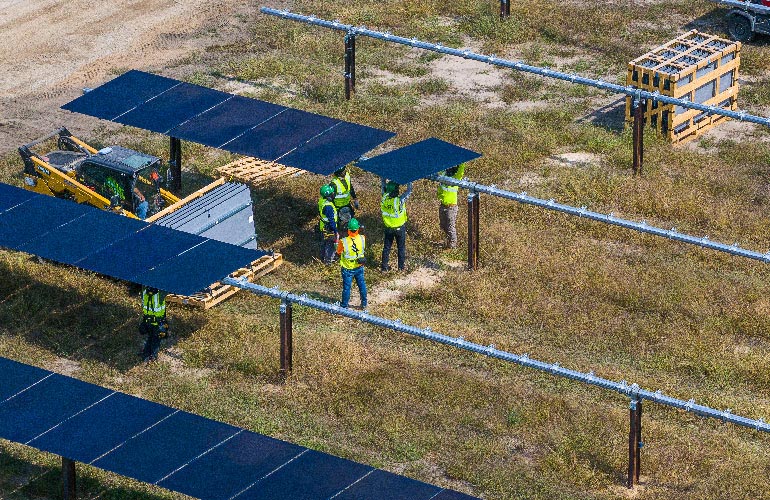
A 250-megawatt solar project is now online in Michigan, located on 1,900 acres of land at the Musgrove Resource Recovery Center, which includes a wastewater treatment facility, landfill, and other environmental sites. Muskegon Solar is Consumers Energy's largest solar energy project. "Consumers Energy is building the power grid of the future to serve homes and businesses in Michigan. Muskegon Solar is an example of the reliable and cost-effective projects we are creating to ensure we continue to meet our customers' needs," said Sri Maddipati, president of electric supply at Consumers Energy. Burns & McDonnell served as the EPC contractor for this project, which features First Solar Series 7 modules, Array Technology trackers, Siemens Gamesa inverters, and cable management tools from Shoals Technologies Group and CAB Solar. "This project showcases the skills and dedication of local male and female workers, and we are proud to collaborate with Consumers Energy on this landmark project for the region," said Chad Cotter, Vice President of Burns & McDonnell's Construction Group. The project includes approximately 0.75 miles of new high-voltage transmission lines to connect the facility to the existing grid infrastructure. A dedicated open-air 34.5/138 kV collection substation is equipped with a main power transformer (MPT) to step up the power generation to 138 kV dead tank circuit breakers and continue the connection to a single access structure for interconnection. The Burns & McDonnell team also designed a 20-foot by 40-foot control box to accommodate all relay, protection, and control systems. A new single-circuit 138 kV transmission line, approximately half a mile long, is designed to connect the collection substation and the remote interconnection switch station.

Okovate Sustainable Energy, a developer of agro-photovoltaic complementary projects, has acquired the assets of Fundusol, a modeling platform born out of Stanford University and Carnegie Mellon University. This acquisition, supported by the Schmidt Family Foundation behind Okovate, brings data-driven precision to the colocated locations of solar energy and agriculture. Okovate is now directly integrating Fundusol's proprietary modeling engine into its development pipeline - a complex technology stack designed to simulate the intricate interactions between solar array architecture and crop phenotyping. This acquisition enables Okovate to transcend traditional development and become a technology data partner for the agricultural community. "By acquiring the Fundusol platform, Okovate is fulfilling its mission to enable American farmers to reliably and data-based enjoy the benefits of agricultural-solar complementarity," said Miles Braxton, CEO of Okovate. "We are building predictive AI tools on top of this genetic model engine, transforming complex solar engineering into actionable insights for rural farmers. This ensures that we are not just building energy projects, but also providing the data-based clarity needed to strengthen the economic foundation of our agricultural communities." The Symbiotic Science Integrated Platform utilizes the SIMulated PLant Ecosystem (SIMPLE) plant biomass model to predict the yields of over 60 different crops. By combining this framework with proprietary irradiance and thermokinetic models, Okovate offers: Genome optimization: Utilizing a customized internal genetic algorithm to determine the ideal configuration of solar panels - such as panel spacing, height, and inclination - to meet the light saturation requirements of individual crops. Accurate phenological insight: High-fidelity modeling to predict the response of specific crops in the microclimate created by solar energy infrastructure. Advanced data visualization: Utilizing 3D system representation and digital twins, farmers and landowners can visualize optimized farm layouts before construction begins.
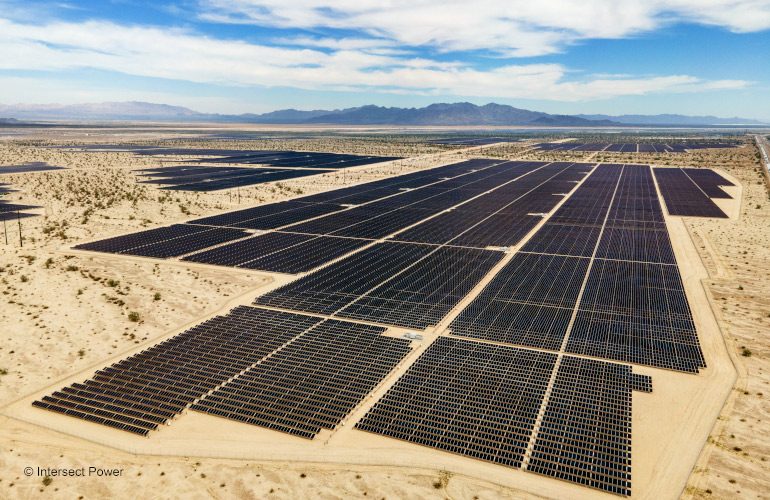
Alphabet Inc., the parent company of Google, announced its intention to acquire renewable energy developer Intersect. Google already holds a minority stake in Intersect through a previous funding round, but will now acquire the company for $4.75 billion in cash, plus assumption of debt. This acquisition was previously announced This acquisition will enable Google to more rapidly develop and add more power generation capacity for its data centers. This transaction includes Intersect's team and its successful existing partnerships, as well as multiple gigawatt-scale energy and data center projects that are either under development or under construction with Google. Intersect will also explore a range of emerging technologies to increase and diversify energy supply, while supporting Google's data center investments in the United States to meet the needs of its cloud customers and users. The operations of Intersect will continue to remain independent under the brands of Alphabet and Google. It will work closely with Google's technical infrastructure team to continue preparations for ongoing development and new collaborative projects; this includes the company's first announced joint data center and power station in Haskell County, Texas, which is currently under construction. Intersect's existing operational assets in Texas, as well as its operational and development assets in California, will not be included in this acquisition. These assets will continue to operate as an independent company, supported by existing investors TPG Rise Climate, Climate Adaptive Infrastructure, and Greenbelt Capital Partners. Intersect anticipates a seamless transition and service continuity for these assets' customers. "Intersect will help us expand our capacity, synchronize new power production with new data center loads more flexibly, and reimagine energy solutions to drive innovation and leadership in the United States," said Sundar Pichai, CEO of Google and Alphabet. "Intersect has always been committed to bringing innovation to the industry, and we look forward to accelerating our development on Google's platform," said Sheldon Kimber, founder and CEO of Intersect. "Modern infrastructure is key to the competitiveness of the United States in the field of artificial intelligence. Together with Google, we firmly believe that energy innovation and community investment are pillars that must be relied upon in the future.". ” The transaction is subject to customary closing conditions and is expected to close in the first half of 2026.
Categories
New Products
Tin Roof Rapid Solar Mounting System with Hanger Bolt Read More
Residential Small Solar Easy Bracket Kit for Home Balcony Read More
Automatic Single Pile Solar Tracker with 10 PV Panels Read More
Angle Adjustable Aluminum Easy Solar Panel Bracket for Garden Read More
Intelligent Single Post Dual Row Solar Tracking System Read More
5000ES Solar Off-Grid Energy Storage Inverter Supplier Read More
Multi Drive Double-Sided Single Axis Tracker System Read More
© Copyright: 2026 Xiamen Wintop New Energy Tech Co., Ltd.. All Rights Reserved.

IPv6 network supported
Friendly Links:
Integrated Solar System